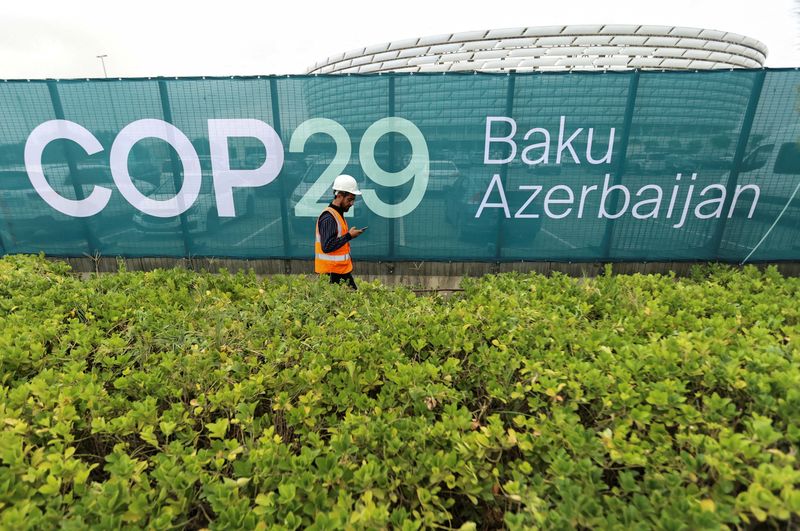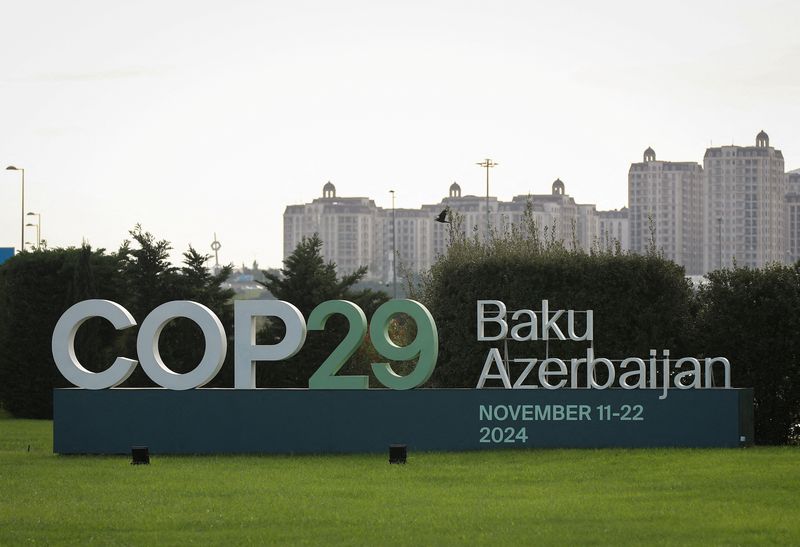(Reuters) - This year's U.N. climate conference in Baku, Azerbaijan, marks the world's 29th leadership gathering to confront global warming since the first "Conference of the Parties" in 1995.
Here are some of the most significant moments in the history of climate talks:
1800s - For about 6,000 years before the industrial era, global levels of atmospheric carbon dioxide (CO2) remained around 280 parts per million ("ppm"). Several European scientists begin studying how different gases trap heat, and in the 1890s Svante Arrhenius of Sweden calculates the temperature effect from doubling atmospheric CO2 levels, demonstrating how burning fossil fuels will warm the planet.
1938 - British engineer Guy Callendar determines that global temperatures are rising in line with increasing CO2 levels, and hypothesises that the two are linked.
1958 - American scientist Charles David Keeling starts measuring CO2 levels over Hawaii's Mauna Loa Observatory, resulting in the "Keeling Curve" graph that shows CO2 concentrations rising.
1990 - At the U.N.'s Second World Climate Conference, scientists highlight the risks of global warming to nature and society. British Prime Minister Margaret Thatcher calls for binding emissions targets.
1992 - Countries at the Rio Earth Summit sign the U.N. Framework Convention on Climate Change (UNFCCC). The treaty establishes the idea of "common but differentiated responsibilities," meaning developed countries must do more to tackle climate-warming emissions because they emitted the most historically.
1995 - UNFCCC signatories hold the first "conference of parties," or COP, in Berlin, with the final document calling for legally binding emissions targets.
1997 - At COP3 in Kyoto, Japan, parties agree to varied emissions cuts for each of the developed countries. In the United States, Senate Republicans denounce the Kyoto Protocol as "dead on arrival".
2000 - After losing the U.S. presidential election, Al Gore begins giving talks worldwide on climate science and policy that eventually are made into the 2006 documentary An Inconvenient Truth. The film wins an Academy Award, while Gore and the U.N. climate science authority - the Intergovernmental Panel on Climate Change - receive the Nobel Peace Prize.
2001 - U.S. President George W. Bush calls the Kyoto Protocol "fatally flawed," signaling the country's effective exit.
2005 - The Kyoto Protocol goes into effect after Russia ratifies it, meeting a requirement for ratification by at least 55 countries accounting for at least 55% of emissions.
2009 - COP15 talks in Copenhagen nearly collapse after wrangling over a post-Kyoto framework, with countries voting to instead "take note" of a non-binding political statement.
2010 - COP16 in Cancun fails to set new binding emissions targets, but the Cancun Agreements establishes a Green Climate Fund to help developing countries cut emissions and adapt to the conditions of a warmer world.
2011 - COP17 talks in Durban, South Africa, falter after China, the United States and India refuse binding emissions cuts before 2015. Delegates instead extend the Kyoto Protocol through 2017.
2012 - As Russia, Japan and New Zealand resist new emissions targets that do not extend to developing nations, countries at COP18 in Doha extend the Kyoto Protocol through 2020.
2013 - Atmospheric CO2 levels cross 400 ppm for the first time in recorded history.
2015 - The global average temperature rises beyond 1 degree Celsius over the preindustrial average. The COP21 talks result in The Paris Agreement, the first pact to call for increasingly ambitious emissions pledges from both developed and developing countries. Delegates also pledge to try to keep warming to within 1.5 C (2.7 Fahrenheit).
2017 - U.S. President Donald Trump pledges to remove the United States from the Paris treaty, which happens in 2020.
2018 - Teen activist Greta Thunberg captures global attention while protesting outside Swedish parliament, and over time, rallies youths to join weekly climate protests worldwide.
2020 - The annual COP is postponed amid the COVID-19 pandemic.
2021 - Newly elected U.S. President Joe Biden rejoins the Paris Agreement. Later at COP26, the Glasgow Pact sets a goal of using less coal and resolves some rules for trading carbon credits to offset emissions.

2022 - The Intergovernmental Panel on Climate Change warns that the world is at risk of catastrophic and irreversible climate change. Later that year, COP27 in Sharm el-Sheikh, Egypt, agrees to form a Loss and Damage Fund for costly climate disasters, but does little to address the emissions fuelling such disasters.
2023 - At COP28 in the oil-producing United Arab Emirates, countries agree to transition away from fossil fuel use.
